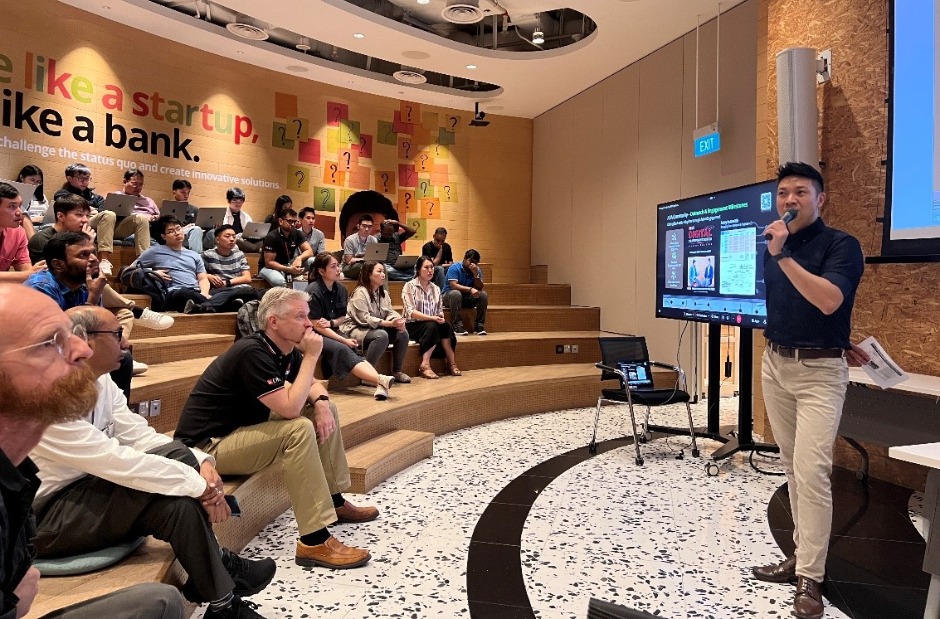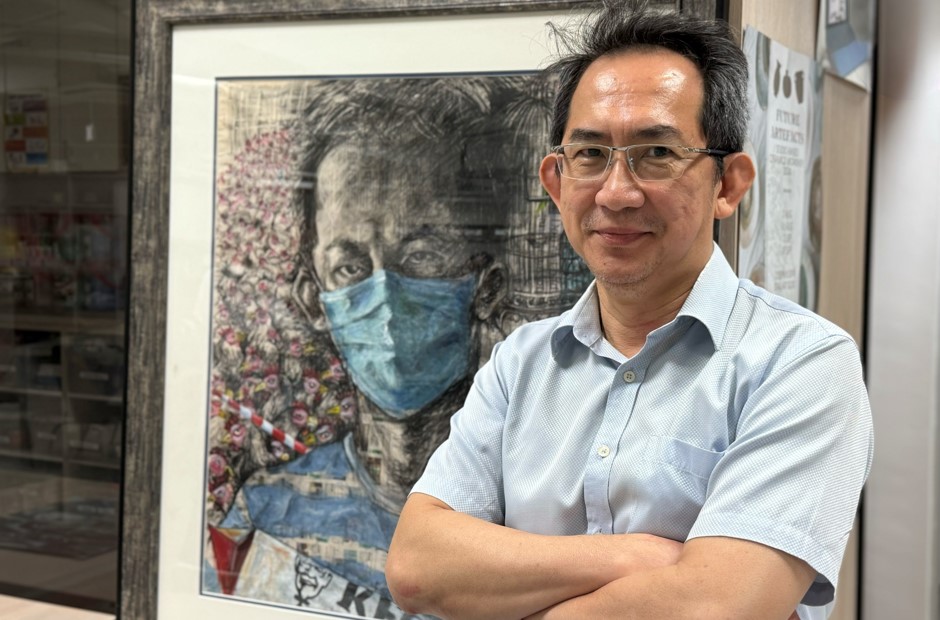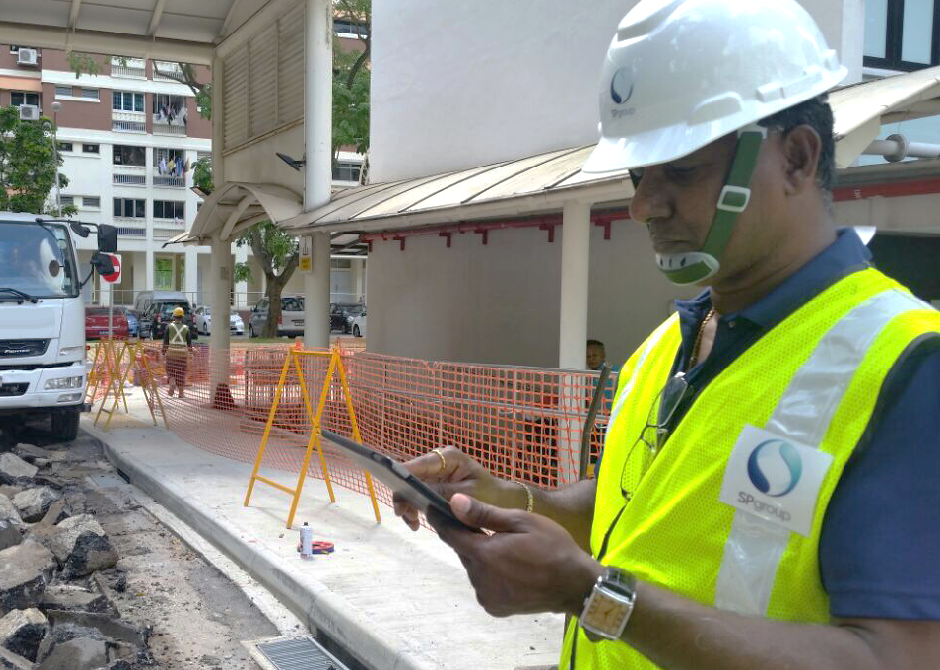Whatever the reason, this is a trend that employers welcome. “Learning is the new currency between employers and employees. Globally, we’re transitioning to a multi-generational workforce,” says Mr Alvin Goh, Executive Director of the Singapore Human Resource Institute.He adds that it is also crucial for business leaders to keep up with the workforce changes by welcoming hires from diverse backgrounds, including those who are older and are from different industries.
Mr Goh was a panellist at a recent MOE Facebook webinar titled Insights Into The World Beyond School on 11 September 2023. It offered broader perspectives of the education landscape and the competencies required to thrive in various industries.
While upskilling could be seen as a natural extension of one’s capabilities, how easy or hard is it on the other hand to reskill?
“Don’t let limits hold you back; challenge them,” Mr Goh adds.” Keep an eye on the changing world, especially in work and technology. But remember, it starts with your inner motivation.”
Schoolbag meets three happy mid-career professionals on how they made the hop in their lifelong learning journey.
1. He had to pull himself out of a career rut
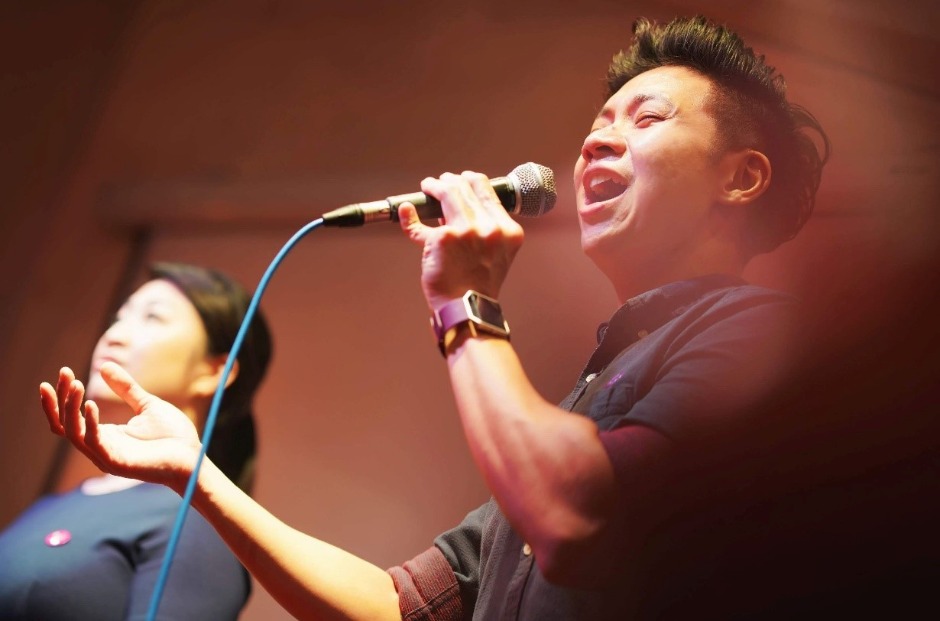
Mr Lum performing at the These Bonnie Isles Lah! show at Blu Jazz in 2018, a production he co-produced with three other Singaporean graduates of the Royal Conservatoire of Scotland.
Making a career switch from theatre to tech seems far-fetched but that is exactly what Mr Jonathan Lum has done.
His current role at DBS Bank involves boosting awareness and the adoption of the bank’s data platform through education and outreach initiatives. “At DBS Bank, my official job title is Data Evangelist; you can Google it. It’s just as cool as it sounds,” Mr Lum quips.
While data analytics and the arts may seem like entirely different fields, Mr Lum points out that both require the skills and ability to generate fresh solutions. “In both theatre and computer programming, creativity relies on a scaffold of skills. You can’t just tell someone to be creative; you must equip them with the necessary skills. Python programming, like the arts, offers multiple paths to achieving the same goal, making it a rewarding challenge,” he says.
Before Mr Lum caught the tech bug, he was an arts practitioner for nearly two decades. His career includes notable milestones, such as portraying Dennis Lee in The LKY Musical, and being one of the few Singaporeans at the time to perform on London’s West End.
With those achievements under his belt, Mr Lum felt that he had achieved what he set out to do and the time was ripe to make way for fresh talent – “I feel this is particularly important in an often-saturated field like the arts,” he says. When the pandemic struck and forced the closure of all shows, he was forced to contemplate his next steps more seriously.
The advent of AI also added some urgency to his search. “I love the arts but at the same time, technological change is going to affect it. For example, generative AI has now morphed how scripts are being written,” he explains; who knows how the rest of the fraternity would be affected next?
While researching potential mid-career opportunities, Mr Lum discovered SkillsFuture Singapore’s website, which led him to Workforce Singapore’s free career coaching sessions.
Mr Lum was drawn to the growing tech sector’s new challenges and opportunities, and made enquiries. He was subsequently placed in a Junior Data Engineering “Train-and-Place” programme under Generation Singapore, a nonprofit that works alongside organisations like SkillsFuture Singapore to prepare people to take on new careers.
“I like to joke that I benefited from the Government’s ‘old people’ subsidy as I received additional funding for the over-40s. The final cost came to $1,500, of which I claimed half from SkillsFuture credits. I paid the other half in cash as I think it’s important to have some skin in the game,” says Mr Lum.
“I still use a lot of my previous skills in my current role as a data evangelist such as active listening, communication, critical thinking.” – Mr Jonathan Lum
Coming from a non-technical background, Mr Lum initially found advanced computing topics like object-oriented programming and unit testing challenging. What helped him soak up all the information during an intense 12-week bootcamp was “friendly competition”. “My course mates and I used a gamified learning platform for technical training modules in our bootcamp. When some of us noticed a leaderboard, a fierce race for the Number 1 spot ensued,” he shares.
Mr Lum admits that switching careers in his 40s came with the concern of securing employment in a field filled with younger talent wanting to get their foot in the door.
To tackle this, he was strategic about looking for opportunities. “It is difficult to convince companies of the value you can bring outside of your tech skills. So, my work attachment with DBS Bank became an important part of showing value to the organisation; that I don’t just have tech skills, but also possess other skills that I have developed through the course of my working career.”
The six-month attachment was part of the Train-and-Place programme. While Generation Singapore has partnerships with multiple employers, Mr Lum secured his attachment with DBS Bank through his own contacts.
After completing his work attachment, Mr Lum converted to a full-time role as a senior associate in DBS Bank’s Technology and Operations department. “A full-time role wasn’t guaranteed, but I proactively worked to improve my odds of conversion,” says Mr Lum, who took on additional responsibilities, such as hosting department events, to enhance his visibility.
He adds, “Although my attachment was in Site Reliability Engineering, DBS later posted a Data Evangelist position in the same department. Recognising it as a perfect fit, I applied and was fortunate to get it.”
In his current job position, Mr Lum shares that the skills that he honed from years of experience as a theatre practitioner are still relevant. “I still use a lot of my previous skills in my current role as a data evangelist, such as active listening, communication, critical thinking, and being able to create presentations to put in front of the bosses,” he says.
2. She wanted to fulfill a childhood dream to save the earth
Ms Low Danli, 41, service delivery executive-turned-sustainability client engagement specialist
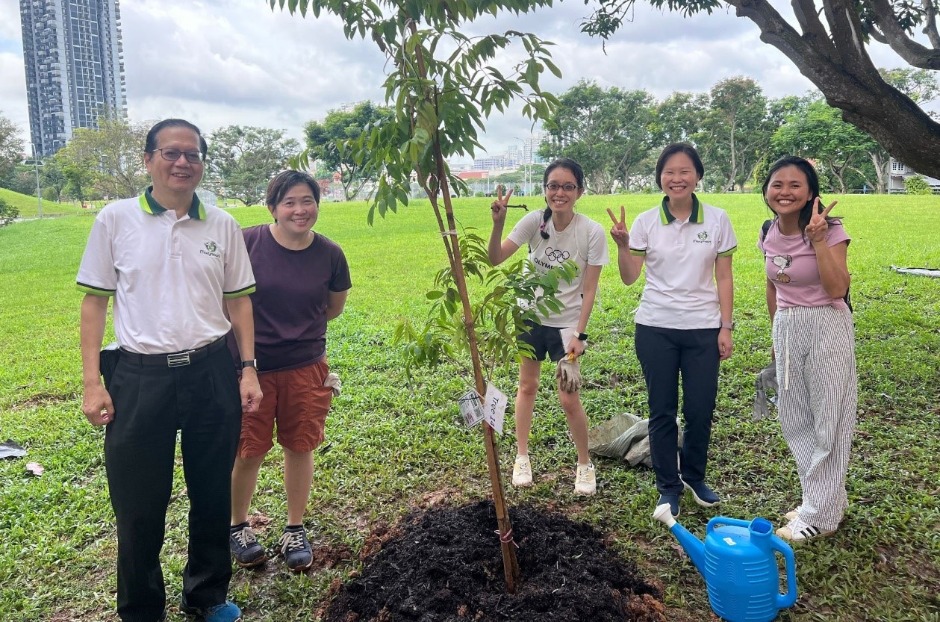
Ms Low (third from right) with Ms Gan Siow Huang, Minister of State, Ministry of Education and Ministry of Manpower, MP for Marymount SMC, at a tree planting event in July this year where Ms Low volunteered.
After spending 14 years in the IT and communications industry, Ms Low Danli made the bold decision to resign from her job to pursue a career in sustainability. Her driving force? The desire to collaborate with like-minded individuals who share her passion in saving the environment.
“While we might not have had the opportunity to pursue our interests when we were younger, now is our chance to do something we are passionate about,” says Ms Low. At the time, she was working as a service delivery executive involved in handling content uploads, tracking banner clicks, and conducting software testing.
Ms Low’s interest in sustainability started at a young age, when she would upcycle discarded materials to give them a second life. “Even as a child, I used to craft my own stationary holders from tissue boxes and toilet rolls. I even created eco enzymes from leftover fruit skins for household cleaning,” she shares.
To get a clearer picture of the learning and career opportunities in the sustainability sector, Ms Low visited a SkillsFuture roadshow where a Skills Ambassador suggested that she enrolled in the Advanced Certificate course in Driving Sustainability for the Future: The Future of Work through a Sustainable Lens at SMU Academy, the professional training arm of the Singapore Management University (SMU). The certificate course is offered under the SkillsFuture Career Transition Programme to help mid-career individuals develop emerging and industry-relevant skills for job roles in the green sector.
Following this recommendation, Ms Low registered her interest in the course through SMU’s website and successfully secured her spot in the programme after an interview. According to Ms Low, the course fees before subsidy was around $20,000. But after tapping on her SkillsFuture credits and the SkillsFuture Mid-Career Enhanced Subsidy, she paid around $1,500.
“While we might not have had the opportunity to pursue our interests when we were younger, now is our chance to do something we are passionate about.” – Ms Low Danli
Over eight months, Ms Low learnt about climate issues and sustainable supply chains during classes held on alternate weekday evenings and Saturdays. Three months into the course, she took on a temporary position as a sustainability executive to gain practical work experience.
Without income from a full-time job to fall back on, Ms Low leaned on her personal savings and upheld frugal and environmentally conscious practices to manage her living expenses.
“Some years ago, I started receiving imperfect produce, which motivated my father and sister to participate as well. We now gather rescued fruits, vegetables, and bread from distribution teams in Toa Payoh, which helps reduce our grocery costs.,” Ms Low shares, adding that she would also pack homemade lunch for work.
Juggling work and her studies was challenging too. “After a full day of work, attending evening classes and participating in breakout discussions can be tiring,” she says. Nonetheless, Ms Low devoted her weekends to reading assigned materials and earned her certificate in March this year.
To help her along in her job search, a career coach at SMU Academy reviewed Ms Low’s resume and sent her sustainability-related job links. Two months after receiving her certificate, she secured a full-time position with the Singapore Environment Council (SEC) through the MyCareersFuture job portal.
Today, she is a sustainability client engagement specialist at SEC. She guides businesses unfamiliar with green initiatives by outlining the criteria and steps necessary to attain an Eco Certification and recommends green efforts that they can adopt.
When she is not advising clients, Ms Low spreads her eco-friendly messages among her colleagues; she successfully persuaded one of them to transition from single-use containers and cutlery to reusables.
“I believe in the power of people’s actions,” she says. “Buildings and certifications alone won’t solve climate and environmental issues if the people within the buildings don’t practise sustainability.”
3. She wanted purpose in her work – and found it in caregiving
Ms Faridah Begum, 46, corporate support officer-turned-enrolled nurse

Ms Begum was inspired by how well her father was cared for by his nurses.
When Ms Faridah Begum’s father was diagnosed with cancer in 2004, the compassionate care he received from nurses influenced her outlook on the helping profession. “Nursing became a calling,” she says.
After coming across a newspaper advertisement for a Singapore Workforce Development programme inviting individuals to join the nursing profession, Ms Begum, who was a corporate support officer then, wasted no time and submitted her application.
Following an interview, SingHealth sponsored her enrollment in the 18-month Nitec in Nursing course at the Institute of Technical Education; the sponsorship also ensured a job placement upon her graduation.
During the interview, Ms Begum was asked why she believed that she deserved the sponsorship. Her candid response was, she recalls, “If I’m given this opportunity, I’m determined to work hard no matter how tough the journey gets. I’ll sacrifice weekend outings to focus on my schoolwork and become a confident, skilled and competent nurse.”
Having left school over 12 years ago, returning to school as an adult learner was not easy. “I wasn’t just a student; I had a son to care for,” Ms Begum says. Nonetheless, she plunged into her studies, juggling family duties while revising for her lessons at night.
“Go with an open mind, be prepared to face challenges and strive to the end.”
– Ms Faridah Begum
The time she spent juggling school and parenthood was worth it. She is currently an enrolled nurse at an obstetrics and gynecology specialist clinic, where she preps equipment, offers financial counselling and triages patients. An enrolled nurse provides basic nursing care and patient education, under the supervision of a registered nurse. Enrolled nurses can become registered nurses by obtaining a diploma or degree in Nursing.
Drawing from her decade-long experience in corporate support, which encompassed HR tasks such as leave management, performance assessments and training, Ms Begum harnesses her attention to detail and interpersonal skills to offer a listening ear to women navigating gynaecological and reproductive health issues.
“I had a patient who came in all worried because she couldn’t feel the baby moving. She had a previous miscarriage, so you can imagine the anxiety,” recalls Ms Begum, who quickly reassured the patient saying, “Don’t worry, we’ve got this.”
The baby was found to be perfectly healthy during an ultrasound scan. Ms Begum says, “Knowing that I could make her day better was just the best feeling.”
When asked how other mid-careerists can prepare themselves for the journey they are about to undertake, Ms Begum advises, “Go with an open mind, be prepared to face challenges and strive to the end.”



